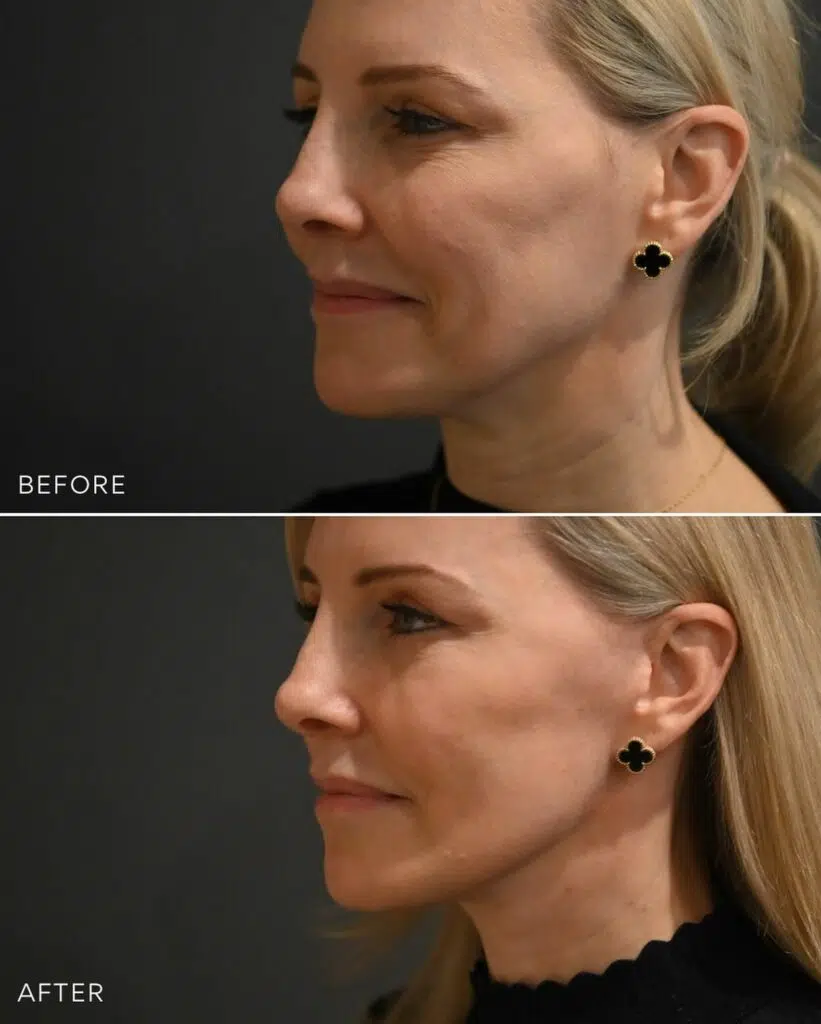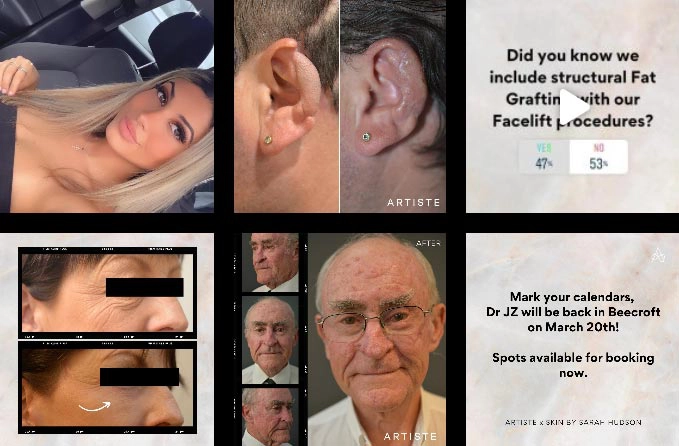Common Signs Of Skin Ageing And Effective Treatments
Model featured in photography

Disclaimer: Results vary and are illustrated as a guide only.
Ageing is a natural process, and how it affects the skin can vary widely among individuals. While there are numerous approaches that may help manage visible changes—ranging from at-home practices to clinical treatments—it’s important to recognise that outcomes are not guaranteed.
Each option should be chosen based on informed, personal decisions and realistic expectations. Consulting with qualified healthcare professionals can provide guidance tailored to individual needs, ensuring that any chosen path aligns with evidence-based practices and personal comfort.
1. Fine Lines and Wrinkles
You might be wondering why skin wrinkles as we age. As we get older, collagen production slows, resulting in fine lines and wrinkles, especially around the eyes, mouth, and forehead.
Home Treatment
- Moisturisation: Regular use of moisturisers containing hyaluronic acid or glycerin can plump the skin and reduce the appearance of fine lines.
- Peptide-based creams These products may be able to provide firmer-looking skin by supporting the natural building blocks of collagen and elastin. Additionally, antioxidant serums that include vitamin C may help protect the skin against environmental and free radical damage.
2. Loss of Skin Elasticity
As elastin and collagen decline, the skin loses its firmness, leading to a loose appearance around the jawline, cheeks, and neck
Home Treatment
- Facial Exercises: Targeted exercises can help strengthen facial muscles, giving the appearance of a slight lift.
- Facial MassagesTry gentle facial massages which may help in improving circulation around the area. Stimulation of blood flow may help with an increase of collagen and elastin, which are essential proteins for skin laxity.
3. Hyperpigmentation and Age Spots
Sun exposure and ageing can cause dark spots and uneven skin tone, often appearing on the face, hands, and chest.
Home Treatment
- Sunscreen: Daily application of sunscreen with at least SPF 30 is the most effective way to prevent further pigmentation.
- Natural Brightening Agents: Ingredients like licorice extract, vitamin C, and niacinamide are known to fade dark spots over time.
Non-Surgical Treatment
- Chemical Peels: Mild chemical peels using glycolic acid or lactic acid can exfoliate the skin and reduce pigmentation.
- Laser Therapy: Laser treatments target melanin to break down dark spots and even out skin tone.
4. Dry and Rough Skin
With age, the skin’s ability to retain moisture diminishes, leading to dryness, flakiness, and a rough texture.
Home Treatment
- Hydration: Drinking plenty of water and using a rich, hydrating moisturiser daily can improve skin texture.
- Exfoliation: Regular exfoliation with gentle scrubs or AHA/BHA products can remove dead skin cells and smoothen rough patches.
Non-Surgical Treatment
- Microneedling: This minimally invasive procedure stimulates collagen production and can improve the texture of the skin.
5. Dull Skin Tone
Over time, dead skin cells accumulate on the skin’s surface, leading to a dull, tired complexion.
Home Treatment:
- Vitamin C Serums: Topical vitamin C can brighten dull skin and promote radiance.
- DIY Masks: Using honey and lemon masks can provide a natural glow, as honey hydrates while lemon offers mild exfoliation.
Non-Surgical Treatment:
- Microdermabrasion: A procedure that gently sands the skin to remove the thick outer layer, revealing brighter, healthier skin.
- LED Light Therapy: This non-invasive treatment uses light to boost collagen, kill acne-causing bacteria, and enhance skin’s brightness.
From simple home remedies to non-surgical treatments and more advanced surgical options, there’s a way to address different signs of skin ageing. Always consult with a dermatologist, your GP or a Specialist Plastic Surgeon, such as Dr Jack Zoumaras, to determine which treatment is best suited to your skin type and concerns. Schedule a consultation today.
Disclaimer: At Artiste Plastic Surgery, our Plastic Surgeons led by Dr Jack Zoumaras have been trained to the highest possible degree. All surgery has risks and it is always advised to get a second opinion. Risks are very real and we cannot guarantee any result. Results are illustrated as a guide only. All risks are managed and any need for revision surgery or complications (1-5%) can be managed by our specialist plastic surgeons.
Any statements on how you will feel is based on Level V Evidence:
Level V: How you will feel after plastic surgery varies between individuals, depending on psychological and physical factors. Our internal research is based on how patients in our practice feel after surgery.
The blogs are not a substitute for a medical consultation and do not form as part of the doctor to patient relationship.
SHARE THIS ARTICLE
Feb02
Planning Facial Surgery in Bondi Junction? What You Should Know
Disclaimer: At Artiste Plastic Surgery, our Plastic Surgeons led by Dr Jack Zoumaras have been trained to the highest possible degree. All surgery has risks and it is always advised ...
Feb02
Why Experience Matters: What to Look for in a Facial Plastic Surgeon
Disclaimer: At Artiste Plastic Surgery, our Plastic Surgeons led by Dr Jack Zoumaras have been trained to the highest possible degree. All surgery has risks and it is always advised ...
ABOUT ARTISTE
Artiste Plastic Surgery is an Award Winning Specialist Plastic Surgery practice led by internationally trained Dr. Jack Zoumaras, Plastic Surgeon and Peer Reviewed Face Surgeon
Artiste offers the latest Cosmetic Surgical Procedures of the Face, Breast and Body, inspired from leading centres around the world.
STAY IN THE LOOP
Enter your email address below to receive updates on new articles and VIP access to promotions and special offers.
FOLLOW US ON INSTAGRAM
